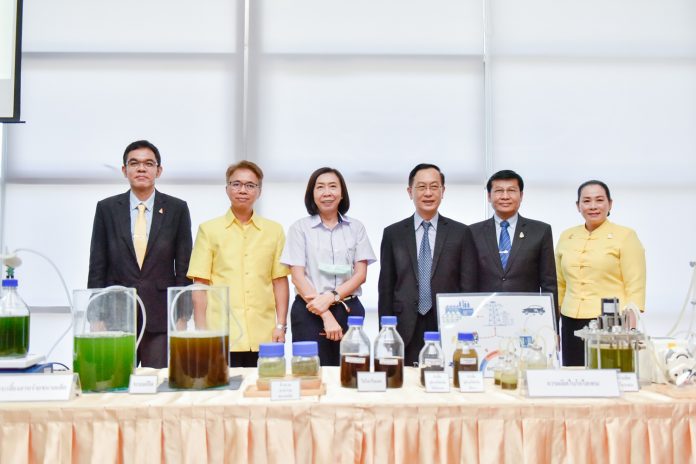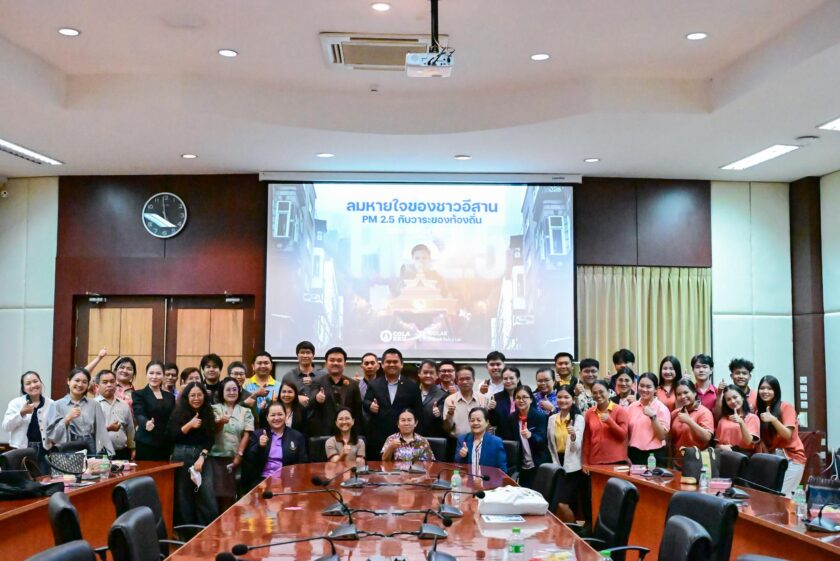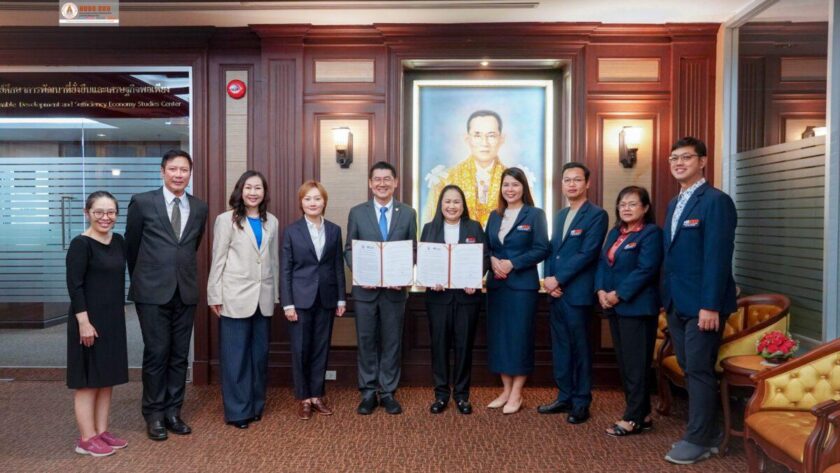Khon Kaen University discloses the research work on production of a new and clean biofuel, “hythane” from algae, which offers high combustion efficiency and is also environmental friendly.

December 4, 2020 at 10.30 a.m. – Khon Kaen University met the press to release news on the research result, “Producing hythane gas from macro algae”. Assoc. Prof. Charnchai Panthongviriyakul, M.D., President of Khon Kaen University welcomed the news reporters. Also joined in the press release were KKU researchers led by Prof. Dr. Alisara Ruangsaeng, a national outstanding researcher in agriculture and biology, a TRF Senior Research Scholar, and a Sarasin Honorary Researcher from Department of Biotechnology, Faculty of Technology. The event took place at Sirikunakorn Room 4, 2nd Floor, Sirikunakorn Building, Office of the President, Khon Kaen University.

Assoc. Prof. Charnchai Panthongviriyakul, M.D., President of Khon Kaen University reported that Khon Kaen University has a mission to support research work for upgrading the quality of life of the people. This research work, which produces a biofuel from macro algae yields an efficient, clean and environmentally friendly fuel. It meets the university’s community policy or the policy for the People and Research Transformation, which will respond to the demands of the users or answer the country’s problems. The university’s work will transform the goal of doing research to be beyond publication, but to the real use and creation of new products or innovations. This research will be greatly useful for the future social world.
There has been an increasing popularity in producing biofuels from biomass. The fuels have been utilized to the greatest extent, such as to produce CBG gas for cooking, to produce thermal or electric energy, or to replace NGV (Natural Gas for Vehicles), or for engines. Besides being an efficient fuel, it is clean and good to the environment.

From the report on Thailand’s energy situation during the first 7 months of 2020 (January thru July), it was found that the need for energy in Thailand still increased with the economic growth. The import value of energy of Thailand is as high as 410,261 million baht, with the crude oil on the top import goods. Therefore, the use of macro alga mass to produce a renewable energy – hythane – is an interesting means to solve the energy problem. In the past research work, new bodies of knowledge have been obtained related to macro alga culture, harvest, and modification of alga mass, including the process in producing hydrogen, methane, and hythane from macro alga mass. The research is aimed at promoting potentiality in industrial manufacturing of hythane that has economic break evens as well as obtaining a clean and environmentally friendly renewable energy.

Prof. Dr. Alisara Ruangsaeng1, a national outstanding researcher in biotechnology from Faculty of Technology, Khon Kaen University revealed that hythane comes from the mixture of hydrogen and methane. Masses of small algae are used to produce this biofuel. It is an interesting alternative for fuels because in the small alga cells there are accumulations of 15-84% protein, 1-63% fat and 7-69% carbohydrate. There is no lignin in the cell walls, making it suitable as a raw material for producing a biofuel. In addition, small algae grow fast and can be reaped for producing biofuel the whole year round. Culture of algae is also easy, requiring a small area. These are the outstanding points for making a biofuel. The research used the biomass of macro algae to produce biofuel. The biomass of Chlorella sp. used was of a very small size that is not visible to our eyes except through a microscope. This alga biomass was used in producing biofuels including hydrogen and methane. The first step was using the biomass of Chlorella sp. to produce hydrogen and then in the next step, the discharged water from the hydrogen production process was used to produce methane. When 5-10% of hydrogen was mixed with 50-65% methane, a gas called hythane was obtained, which has become a biofuel of high combustion efficiency, is a clean energy and environmentally friendly.

“Hythane is a result of true biofuel manufacturing. It can replace nonrenewable fuels. Research in production of biofuels usually rely on farm produces such as sugarcane, corn, cassava, for example, hydrogen, methane, biodiesel, and ethanol. It has been a controversial matter that even though biomass plants yield high-quality biofuels, they require enormous land plots to grow. The growing involves the use of insecticides, which can affect the ecological system. There has also been an important argument over the use of the food crops as energy crops. Hythane, a biofuel from alga mass, is truly clean and environmentally friendly in this regard,” said the Professor.
News: Jiraporn Pratomchai
Photos: Boriphat Thaisi / Seksan Nahuanin

































